September 2004
Interview by Shannon West
I was hooked from the start. When Al Jarreau’s first album, We Got By, showed up in the new music bin at my college radio station I grabbed it, put it on, and literally stopped in my tracks. Twenty-four years later Accentuate the Positive had the same effect. Maybe even more so because he brought back some of the songs my mom played for me when I was a little kid and already destined to be one of those people who fall in love with songs.
To finally schedule this interview at a time when he has released a CD that he is joyously proud of and we are launching a website that we are joyously proud of was pure serendipity. This was a series of conversations interrupted by the passage of a hurricane and the accompanying power outage, but if you have the chance to talk to Al Jarreau you just buy batteries for the recorder, hope the cat doesn’t knock over the candles and, well, Accentuate the Positive!
Jarreau’s love for music and for his audience were recurring themes. Nobody gives more onstage or in the studio. The lifelong connection he has with this material and the fun he had recording it are what separates Accentuate the Positive from the rest of the pack of standards-based current releases. He calls it a personal milestone and says it is definitely the kickoff of the second half of his career, which promises to be as adventurous, magical, and even more unpredictable than the first half.
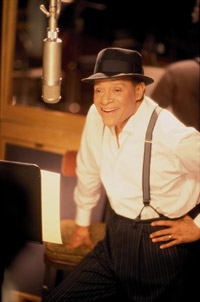 SmoothViews (SV): You are speaking of this as the launch of the second half of your career at a time when the industry says youth culture rules and longevity and artist development are not much of a consideration. Yet you have created a genre-skipping career that just keeps evolving and growing. SmoothViews (SV): You are speaking of this as the launch of the second half of your career at a time when the industry says youth culture rules and longevity and artist development are not much of a consideration. Yet you have created a genre-skipping career that just keeps evolving and growing.
Al Jarreau (AJ): That’s exactly what I wanted it to be. I really do see it as the start of the second half of my career. Obviously given good health, and a continuing audience and a record company that allows me to do music. So given those things yes, I’m introducing some new music that people haven’t really heard me do in quite this fashion. I’ve made various forays as an R&B pop singer with some jazz over/undertones and some jazz songs along the way. Obviously my attitude onstage and way of performing is a jazzy way of performing, but this is really the first jazz CD I’ve done where I really went out of my way to approach it with the idea of finding some great classics and some standards, do it with a stripped down group, a quartet or trio. No bells and whistles, no overdubs or horn sections. Just kind of simple and organic.
SV: You’ve been talking about doing a jazz album for years. When did you realize it was actually going to happen?
AJ: I didn’t have that feeling until I began to pick the songs and Larry (Williams) and I were coming up with arrangements. I’ve been saying for almost 20 years that I need to do a jazz project and it ought to be either big band or I should do some jazz songs with a trio or quartet. The process began with some talks with Tommy LiPuma and Al Schmitt who were both involved in my early albums. If we did something together shouldn’t we do something that you could predict in the grooves as long ago as the Look To The Rainbow album? We started talking about a year ago. I have been with the record company and Tommy was there doing records with other people. They signed me because they liked what I had been doing, but from the start there had to have been this notion that Al is due a jazz record and wouldn’t that be fabulous if he did the first real jazz record with this label and with Tommy LiPuma. And that’s what happened!
SV: What was it like to reunite with Tommy LiPuma and Al Schmitt after all these years?
AJ: We laughed! It was infectious! We’re recording live, I’m singing live. We’re laughing about how much fun it is to perform that way. We are laughing about the fact that we set out to do 30 tracks a day and any one of them could have gone straight to the record store as they were. We are just fanatics about using the technology to make it all wonderful. We laughed at the fact that we were having such a great time working this way. Al and Tommy and I sharing the biggest laugh because it was predicted by everything we did in the first three or four records in my career. It was predicted in the grooves that we would be here sometime later on down the road. How wonderful that God saved this special moment for us three guys to do Al Jarreau’s first real jazz record. It was from top to bottom a joy.
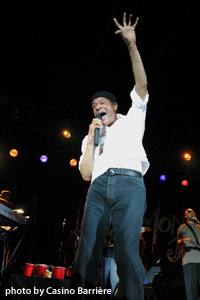 SV: If it has been in the back of your mind for all these years there must have been a lot of songs that you thought about singing. How did you narrow it down to the group of
songs that ended up on the CD? SV: If it has been in the back of your mind for all these years there must have been a lot of songs that you thought about singing. How did you narrow it down to the group of
songs that ended up on the CD?
AJ: I found one of the fake books that have thousands of songs that jazz musicians refer to all the time and I started running my fingers down those lists of songs and recognized them and thought "I've gotta do these songs." As I looked at the list of songs all I did was confuse myself. After putting myself in that kind of mode maybe I opened up another door, then these songs started coming to mind that have been my "best friend songs." These songs are old friends I have entertained myself with when I’m washing the dishes, driving to the store and walking down the aisles. The ones that you sing when you’re driving in the car and as a singer you always go back to them. I’ve been singing the basic rhythmic feel for "Accentuate the Positive" for 15 years and just couldn’t figure a way to put it on a CD. I began "Scootcha Booty" with Russ Ferrante close to 20 years ago, and the first time I heard Eddie Harris’ "Cold Duck" I knew I wanted to do that song.
SV: So a lot of these songs had been with you at some level for years??
AJ: Lots of them. I mentioned “Cold Duck.” I only had the beginning of it. "Beautiful funk from a hole in the horn" came more recently but the notion to write the lyric for this song that was so jazzy and funky at the same time was there for a long time. There is a lot of me on this CD too but it mostly comes from lyrics I wrote for classic things like "Cold Duck" and "Groovin’ High" and then "Lotus." And obviously "Scootcha Booty" is mine and Russ Ferrante’s.
SV: You said you sang differently than you had ever sung before. How?
AJ: It’s all in the material. These are classics written during the golden era of songwriting
that I had learned and was familiar with. It is a facet of me that they (fans) haven’t seen because the material asks me to do things that only this material asks me to do. To sing the ballad with a knowingness about what you are talking about. If it’s somebody else’s lyric, and the message is a little unusual for you, it requires that you learn that new message. So I am singing it in a way that people rarely hear me sing. It has to do with the particularities of the songs on this album because they were written in a different era. Still, these songs are connected to what I have done before because they are where I learned to sing a ballad.
SV: On your website you said that the name of the CD was Accentuate the Positive and that that needed some explaining beyond it being the title of one of the songs…
AJ: That’s who I am. That’s the way I try to live. I think it’s the only way for human beings at this point in our evolution as souls, where everyone in their lifetime is going through stuff. Stuff that can be so painful, so depressing it’s hard to wake up in the morning, and if you watch the news you’d believe we are going to hell in a handbasket and so we have to turn away from bad news merchants.
SV: How do you do that??
AJ: Once you discover that you can, then you must. And it’s not easy. You have to take direct steps. You really have to count your blessings and you have to make a decided effort to not get seduced by the blues. Any success, any happiness that we have comes from deliberately, consciously saying "You know what, I’m gonna make a list of what’s going on good in my life, and I’m going to celebrate that stuff instead of having a parade for what’s going wrong." And maybe somewhere along the way you learn that God wants us to be happy. I don’t know where we got the notion that God wants us to suffer. Every living thing tends toward the good or we would have been gone a long time ago.
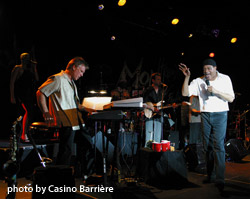 SV: In "Betty BeBop’s Song," the song you wrote about Betty Carter, it seems like you actually wrote and sang the way that she phrases and sings her original material. It’s different from the usual tribute song. How did that come about? SV: In "Betty BeBop’s Song," the song you wrote about Betty Carter, it seems like you actually wrote and sang the way that she phrases and sings her original material. It’s different from the usual tribute song. How did that come about?
AJ: I thought we both shared that exuberance in the live situation and a spontaneity that I recognized in myself when I saw her perform. I saw her at the Jazz Workshop in Boston right after I did the We Got By album and I had seen some TV performances. I hadn’t thought about that until I was in Spain playing this festival. I was in the hotel, Freddie Ravel (co-writer) had come downstairs, and we were doing a press conference. Over at the other end of the lobby Mulgrew Miller, who was the piano player for Betty, was rehearsing a trio. We finished, he comes over, and we are chatting, and he says he worked with Betty Carter for 12 years. I’m kinda speechless and “wow!”. I say, "Say 'Hi' to Betty for me, and tell her how much I love her music." And he said, "you know she passed away," and I about fell on the floor. My eyes went blank, and I stared off, and the music started. It was raining, and the sun was shining at the same time, and there were these big bay windows, and there was the blue in the sky, and the sun on the trees, and it was drizzling. That’s where the line came from "I thought I'd drop a line just saying how your songs been playing... A pretty pitter patter it lightly played, the summer rain upon my face." I brought my best literary and writing skills to bear on this song and decided I’m not going to sing a hot burning bebop jazz song. I want to sing one of the most delicate waltzes that people never get to hear. Nobody wants to sing a waltz. The closest they get to it is a version of "My Favorite Things," but nobody sings a waltz anymore.
SV: "Waltz for Debby" seems to capture both the essence of childhood and the emotions a parent has watching their child grow up..
AJ: Gene Lees, the Downbeat writer wrote the lyric, and there’s a Jobim song that he also wrote a brilliant lyric for. Singing "Waltz for Debby" when I was 23 or 24 taught me how to write "We Got By," a waltz, taught me how to sing that version of "She’s Leaving Home" and the poignancy of that kind of waltz. Singing "Waltz For Debby" taught me how to do all those things I’m talking about including write this song that I had to resist calling "Waltz for Betty."
SV: How did you end up with the "Be Quiet and Listen" lyric for "Groovin’ High"? It doesn’t seem like the theme that a song like that that is fast and bebop would ask for?? And how did "Whispering" end up in the middle of it?
AJ: I did something I may get punched in the nose for when I run into Dizzy and all those other jazzers who took the chords of a song like (singing) "whispering while you cuddle near me" renamed it "Groovin’ High" and wrote these complex bebop lines for songs that already existed. That’s where I began. So once you decide that at some point you’re going to sing "Whispering" then how does that affect the rest of what you write about whispering? OK, so let’s write about being silent sometimes and just listen, and that’s what I wrote. The fun part was the little surprise that it might excite in some people to write that lyric and reveal that the song is really "Whispering." I devilishly thought ‘ooh what fun’ while clapping my hands together (laughs).
It was a common practice back then to take a pop song and write a complex bebop line for it and retitle it and who knew??
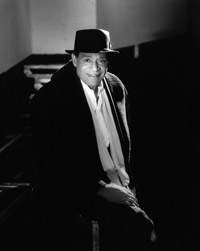 SV: You literally rearranged "I’m Beginning To See The Light" and juggled the verses and chorus around. It’s really a surprise when as a listener you realize it’s a familiar song. SV: You literally rearranged "I’m Beginning To See The Light" and juggled the verses and chorus around. It’s really a surprise when as a listener you realize it’s a familiar song.
AJ: I have never performed that song. Talking about gifts from God and being in touch with the universe and being in tune with the moment! I haven’t sung that song two times completely in my life, and there I am driving down the freeway, and I hear and start to sing "never." That’s where it began, "never," and I recognized I’m singing the big band horn shout from the middle of a Count Basie arrangement. Start there. What is the song? “Never..no never.” Disguise it for a while and let people have fun with the puzzle. I pulled over and called Larry (Williams) and said, "I don’t want to lose this. Turn on the recorder and let me put this in so we have it when we get there." I knew that this would be a great organ tune. Larry and I showed Tommy the basic idea and he said let's call Larry Goldings, and that was it. He walked in the studio, and Larry had laid out a basic chart, and it was more than I dreamed of. That sound of the B3 organ. Wow.
SV: Lotus captured the idea of "less is more" so perfectly in the arrangement and the way you sing it. So many people are trying to bring more simplicity and quiet to their lives and that is both the sound and the message of this song. How did you come up with that imagery?
AJ: Some of it is feelings and notions that I have had about that simple flower. In that picture on the "Look To The Rainbow" album there’s a little pendant that I am wearing around my neck that is a picture of a lotus. So I’ve had kind of an affection for it and didn’t know that one day I would be writing about the simple beauty of the lotus flower and using it as metaphor for looking inside for simple things going on in there. I mean the heart and the spirit are connected to this God force and source, and you have to be quiet to listen to that. You can’t be thrashing around. I only later discovered after I’d written that lyric that the lotus flower only grows in the swamp. That’s part of this appreciation and love for that simple flower that ancient Asian religions and philosophies have had for years. I’ve always loved the simple beauty of any flower, or a tree. So it was a surprise, the significance of Lotus that I didn’t know about, but somehow I tuned into the feeling
that there was a beauty in this flower that was so simple. It doesn’t speak, it doesn’t ask for anything, it just blooms.
SV: Over the years we have put this music on a pedestal labeled "jazz" and begun to think of it as something to be studied and analyzed, yet when these songs were originally performed they were the soundtrack of peoples lives, people listened to them the way we listen to pop music, they danced to them and fell in love to them. This CD seems to bring them back to the original context and make them accessible and contemporary again…
AJ: I don’t think this is esoteric or classroom stuff. It can be and in a sense it certainly was for me because learning to sing these songs taught me to be the Al Jarreau that people know. It’s a jazz record but it’s not hard to understand. I think the audience that I have been coddling and carrying around on my shoulders for a long time is ready for me to make this step. I don’t think it’s a big leap for them to hear me sing "Groovin’ High." All of that stuff I sang before this was preparation for this kind of project, and I think beyond my typical audience is a group of people who are R&B people and pop people who can easily listen and go "This is Jazzy Jarreau. It’s just Al singing a little different kind of song than we’ve heard him sing." I think it is real listenable stuff.
SV: The backup musicians you used on this CD haven’t been on your other projects or in your touring bands. How did this group come together?
AJ: That’s Tommy, this great producer who comes in contact with people and must have a mental library of personnel who are great for this and great for that, and he brought this whole group of musicians to the project that I’d never worked with before. I could easily have gotten together with someone like Larry Williams and said who will we use? He would have ticked off a bunch of names of people who have traditionally done this. But Tommy, the consummate producer, knows the young cats...the people who not only know the genre but bring their own thing. Some producers can write out the charts and tell everybody what to play and that’s really important but Tommy isn’t going to write a chart. He’s gonna sit and listen with these huge ears that bring all this experience from listening to everything from bebop to show tunes and then remembering that. These are Tommy’s picks. These musicians did a brilliant job, but I think it was just as brilliant for Tommy to recognize it.
SV: Have you thought about doing a tour based on this material, doing jazz vocals with a trio or quartet?
AJ: I have. I’ve thought about doing it as soon as it is possible with this new CD getting some wings and getting out there. I don’t know how soon that will be. If the record takes off and becomes huge in six months it will be then that we do that kind of tour and add some other stuff to the repertoire and do things of this sort that are on the CD, or are not on the CD, but are pieces that are real jazzy and classic. I’m really looking forward to it because it will give me the opportunity to do the whole other kind of approach to the music live that I haven’t had a chance to do. and I think is important for me to do.
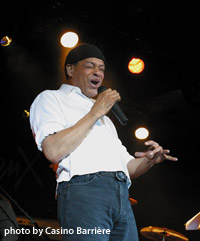 SV: Speaking of live performances, any chance of another live CD. Tenderness was live but it was in a controlled setting on a soundstage with an invited audience, other than that you haven’t really done a live album since Look To The Rainbow. SV: Speaking of live performances, any chance of another live CD. Tenderness was live but it was in a controlled setting on a soundstage with an invited audience, other than that you haven’t really done a live album since Look To The Rainbow.
AJ: It’s on the list. That should be a perennial. It should be there every time I talk about what’s up in the future. More live recording. I have missed the boat over my career by not doing every second or third CD live because things happen onstage that don’t happen in the studio. Something happens between me and an audience which is again a gestalt; artist plus audience makes a live performance. With me it is more because something happens that gets beyond that. Something happens, and it’s a communication. There are times when me and the audience are in the zone.
SV: What is it like to be the center of that?
AJ: There’s a consciousness that you reacquire afterward, but when you are in the middle of it you are not the center of it, it’s just happening around you. It’s like being abducted by the muses. That’s how it is when you’re in the zone. Then you try to identify the pieces that made this feeling of being off your feet and in the air, and it’s a state of mind that is created. And boy is it fun to be there!
SV: If you were to go back and do a more contemporary pop R&B project do you think you could bring some of this voice to that material?
AJ: I certainly hope so. The connection weaves itself nicely. We did arrangements that allowed me to be who I am today but still opened the door for me to sing some things in a way people haven’t heard me sing. There’s a connection between how I sing "The Nearness of You" and any number of ballads I’ve sung. I love presenting that retro feel in the middle of all this contemporary Pop R&B kind of material. I will bring some things from this CD to future CDs.
SV: You want to do some more genre skipping; you’ve mentioned a Brazilian project, possibly a blues or a big band album. So how are you going to sing Blues or sing with a Big Band??
AJ: The same way! I think that’s the approach. Learn it well in your head, know it well, pick things you know and bring the old you and all the experience you have from singing these various kinds of feelings that are still related to what I have done in the rest of my career.
top of page
|

